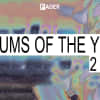 Listening to Julia Holter discuss music school, you sense mild survivor’s trauma. “A typical piece I would hear there would be, like, ‘I’m writing a string quartet, and there’s a salsa rhythm in the middle, and then there’s some very austere, dissonant chords,’” says the 27-year-old singer/composer, whose 2011 LP, Tragedy, enthralled experimental buffs and bedroom-pop aficionados alike. “It was like throwing soda, Jolly Ranchers and ice cream in your beef stew. And I did this too. I wrote really bad music.”
Listening to Julia Holter discuss music school, you sense mild survivor’s trauma. “A typical piece I would hear there would be, like, ‘I’m writing a string quartet, and there’s a salsa rhythm in the middle, and then there’s some very austere, dissonant chords,’” says the 27-year-old singer/composer, whose 2011 LP, Tragedy, enthralled experimental buffs and bedroom-pop aficionados alike. “It was like throwing soda, Jolly Ranchers and ice cream in your beef stew. And I did this too. I wrote really bad music.”
Given Holter’s broad jumble of influences, you’d think she was still at risk. Growing up in LA, she studied classical piano, checked out oldies and contemporary R&B (“slow songs from the ’90s”) and went through an obligatory Radiohead/Smiths phase. While in college, she spent an intense month in Benares, India, learning from vocal master Pandit Pashupati Nath Mishra. “He would bring me chai tea, and he would sing at me and I would sing at him,” she says. “It was really hard on my voice.” Later, during grad school at CalArts, Holter worked with minimalist bigwig Michael Pisaro, who encouraged her interest in field recording. “I was creepily sitting in a café recording everyone, which I don’t like to do,” she says of one sound-collecting trip. “Actually, I do like to do that, but I know it’s weird.”
Fortunately, though, Holter has moved past her soda-in-the-stew stage. Her new LP, Ekstasis, is diverse but holistic; you hear shimmery strings, Holter’s soothing voice (often multiplied into a reverb-cradled chorus), raga fragments, shades of ’80s synth pop, tripped-out drone excursions and bass clarinets that honk like geese, yet there’s no sense of remote control ADD. The best pieces, like the six-minute stunner “Our Sorrows,” flow seamlessly from ethereal pop to pure-sound trance and back again, like de–New Aged Enya, with all the wonder and mystery restored.
Pre-Ekstasis, Holter tried out whimsical homemade pop (2007’s Eating the Stars, which featured a cover of Crowded House’s “Don’t Dream It’s Over”) and cryptic longform sound collage (2010’s Celebration, the one with the “creepy” field recordings). But it was on Tragedy, a meticulously-paced epic based on the Euripides play Hippolytus, that Holter found the unclassifiable hybrid she’d been seeking ever since she fell for Miles Davis’ Live-Evil in high school, a genreless space in which free-floating meditation could coexist with unshakeable hooks.
The magic deepens on Ekstasis, but Holter’s still not satisfied. When I mention that some of the record’s synth-sourced beats summon a retro feel, she seems a little vexed. “I love ’80s beats; everyone does,” she says, citing the trusty Casio she uses as a drum machine. “But I’m not going for something cutesy.” The human drummer she’s enlisted for live shows should help. “I think it’s good for people to have an intimate experience with themselves and just record,” Holter says, knowing she sounds hippie-ish. “But I think it’s time to move on.”



